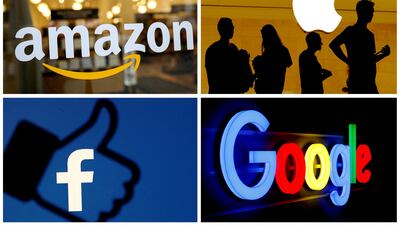The EU on Saturday approved a milestone law regulating online content on platforms owned by big technology companies, which face billions of dollars in fines if they do not comply with requirements.
The Digital Services Act will overhaul rules for the bloc's 27 countries, aiming at industry majors including Facebook owner Meta Platforms, Google and others, which have been under fire as they are accused of becoming vehicles for the spread of disinformation and harmful content.
Social media services, such as TikTok and Facebook-owned Instagram, are also affected by the new rules.
Non-compliance will be severely punished, as the Act, which comes into force as early as 2024, states that companies could be fined as much as 6 per cent of their global annual sales.
For example, if found in breach, Google, the world's largest internet company, owned by Alphabet, would pay more than $15 billion based on their reported 2021 annual sales of almost $258bn.
“With the DSA, we help create a safe and accountable online environment,” Margrethe Vestager, the European commissioner for competition, said on Saturday.
“With today’s agreement we ensure that platforms are held accountable for the risks their services can pose to society and citizens.”
Big technology companies have been repeatedly lambasted by regulators over their business models, which lack oversight and have created breeding grounds for the spread of harmful content, including hate speech, disinformation and fake news.
Their top executives have faced grilling from regulators, most notably in the US and Europe, as they tried to defend their products and pledged that they would do better to police the content running through their platforms.
Facebook, for instance, started its own Oversight Board to review the content on its platforms, including Instagram and WhatsApp. Critics, however, weren't convinced, doubting its effectiveness, given the board's composition. News site Politico described it as "an unapologetically globalist mix of academic experts, journalists and political figures".
It also received condemnation from the US Congress in October after Frances Haugen, a former employee, came forward as a whistle-blower on policies and practices inside the company. Legislators accused the social media giant of allowing the sowing of divisions, harming of children and fuelling of ethnic violence in its insatiable quest for ever-bigger profits.

In January, it was reported that Google chief executive Sundar Pichai and Meta chief executive Mark Zuckerberg personally approved a secret advertising deal in 2018 that reportedly gave Facebook unlawful privileges on Google’s advertising platform, court documents showed.
The DSA was approved after a year of debate. Its key regulations include bans on using sensitive data such as race or religion for targeting ads, targeting any ads to minors and so-called dark patterns, which are tactics to push people into consenting to online tracking.
Ms Haugen said the DSA could represent a “global gold standard” for regulating social media companies.
The act states that all websites will be accountable, but stipulates that platforms with over 45 million users need to abide by stricter rules such as paying Brussels a supervisory fee of as much as 0.1 per cent of their global annual revenue to enforce the law.
“With the DSA, the time of big online platforms behaving like they are ‘too big to care’ is coming to an end,” said Thierry Breton, the EU's internal market commissioner.
Companies are also required to submit annual reports about illegal and harmful content on their sites to regulators. They will also need to explain to the EU what actions they are taking to fight off harmful content, including misinformation or propaganda during crises, acts that were rampant during the Covid-19 pandemic and Russia’s military offensive in Ukraine.
The EU has been serious about regulating online content. It introduced the General Data Protection Regulation laws in 2018, though its penalties ― as much as €20 billion ($21.6bn) or 4 per cent of a company’s global sales ― are less than those provided for under the DSA.
So far, the largest fine imposed was a €746 million slapped on Amazon in July for allegedly breaching the bloc’s data protection rules through its processing of users’ personal information. The company is currently appealing that penalty.









